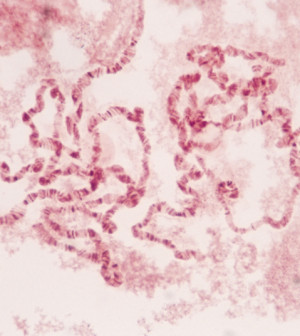- Could Your Grocery Store Meat Be Causing Recurring UTIs?
- Are You Making This Expensive Thermostat Error This Winter?
- Recognizing the Signs of Hypothyroidism
- 10 Strategies to Overcome Insomnia
- Could Artificial Sweeteners Be Aging the Brain Faster?
- Techniques for Soothing Your Nervous System
- Does the Water in Your House Smell Funny? Here’s Why
- Can a Daily Dose of Apple Cider Vinegar Actually Aid Weight Loss?
- 6 Health Beverages That Can Actually Spike Your Blood Sugar
- Treatment Options for Social Anxiety Disorder
Hope to Live to 100? Check Your Genes


Healthy eating and exercise might help most people live to a respectable old age, but making it to 95 or 100 might require help from your DNA, a new study finds.
“Genetic makeup explains an increasingly greater portion of the variation in how old people live to be,” especially for people approaching or exceeding the one-century mark, study co-author Dr. Thomas Perls, of Boston University, said in a university news release.
In the study, a team led by professor of biostatistics Paola Sebastiani looked at thousands of sibling groups in New England in which at least one person reached age 90.
For people who lived to age 90, the chances that their siblings also reached 90 was only about 70 percent higher than for the average person born around the same time, the study found.
But genetics began to play a bigger role as the number of birthdays came and went.
For example, for people who lived to age 95, the chances that their siblings also reached 95 was 3.5 times higher than normal, the study found. For people who lived to 100, the chances that their siblings also reached 100 was nine times higher than normal.
And for those few people who lived to 105, the chances of their siblings also reaching 105 was a whopping 35 times higher than normal, the researchers found.
According to Sebastiani’s team, reaching the age of 105 is about 1,000 times rarer than making it to age 95.
The study was published online March 26 in the Journal of Gerontology: Biological Sciences.
The findings support the theory that genes play “a stronger and stronger role in living to these more and more extreme ages,” the researchers said.
They also believe that the combinations of longevity-linked genes that help people survive to age 95 might be different than those that help people reach age 105.
“For a long time, based upon twins’ studies in the 1980s and early ’90s, scholars have maintained that [only] 20 to 30 percent of longevity or even life span is due to differences in genes, and that the remainder is due to differences in environment, health-related behaviors or chance events,” said Perls, a professor of medicine at the university.
However, he pointed out that “the oldest twins in those studies only got to their mid- to late-80s,” so it’s only studies like the one just conducted that can help scientists understand why people can live to extreme old age.
Since it appears that genetics begin to play a much larger role in helping people live past 100 or 105, research that focuses on these extremely old individuals is, “much more powerful in discovering longevity-related genes than studies of people in their 90s,” Perls said.
More information
The American Academy of Family Physicians offers health advice for people 60 and older.
Source: HealthDay
Copyright © 2026 HealthDay. All rights reserved.










